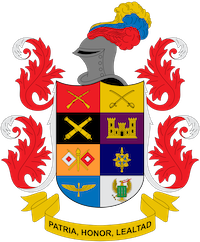Geostrategy in Colombian foreign policy
Abstract
This article explores geostrategy in Colombian foreign policy and its relevance in projecting national objectives at the international level, bearing in mind that geostrategy is one of the factors that generate national objectives at the global level, requiring synergy between national institutions and the President of the Republic in the formulation of foreign policy.
To understand the basis on which the States base their strategies in this field, there are three models of analysis by Kenneth Waltz (1967), which are: 1. Systemic level, 2. State level and 3. Individual level, which allow an easy understanding of the basis on which States base their foreign policy decisions. In the Colombian case, it will be explained, through the individual analysis model, why the foreign policy is a government policy but not a State policy, which leads to a short term policy without any structured continuity; furthermore, it shows that there is no active participation of society in the formulation of this policughout this article it will be analyzed why the role of geostrategy is important for the y, therefore, throColombian foreign policy.
Downloads
References
Ardila, M. (1991) Ardila Martha. ¿Cambio de Norte? Momentos críticos de la política exterior colombiana. Bogotá D.C: Tercer mundo editores.
Brzezinski, Z. (1998). El gran tablero mundial. La supremacía estadounidense y sus imperativos geoestratégicos. Barcelona: Paidós Ibérica, S.A.
Carvajal, L., & Amaya, R. (2005). La política exterior de la administración Uribe (2002-2004): Alineación y securitización. Cuadernos del CIPE, 2.
Constitución política de Colombia 1991.
Deutsch, K. (1982, 9). Como se faz política externa. En VV.AA. O estado e as relacoes internacionais, editorial Universidade de Brasilia, 1982.
El Tiempo. (2 de abril de 1996, 7-A). Diario el Tiempo, p. 7-A. Bogotá.
Keohane, R. & Nye, J. (1988). Poder e interdependencia. Buenos Aires: Grupo Editorial Latinoamericano.
Mason, A. (2003). Las esferas de la autoridad global y local: implicaciones para Colombia. En A, Mason & L. J, Orjuela. La crisis política Colombiana: más que un conflicto armado y un proceso de paz. Bogotá D.C: Ediciones Uniandes.
Morgenthau, H. (1952). Another Great Debate: The National -Interest of the United States. American political Science Review.
Nitze, P.H., Rearden, S.L & Smith, A.N. Hiroshima a la Glasnost: memorias. Buenos Aires: Grupo Editorial Latinoamericano (GEL).
Putnam, R. D. (Summer 1988). Diplomacy and Domestic Politics: the Logic of the Two-Level Games International Organization, 42, 3, 427-460. Recuperado de: https://hpeb08.files.wordpress.com/2008/08/putnam.pdf.
Rourke, J.T. (2003). International Politics on the World Stage. Nueva York: McGraw-Hill Higher Education.
Rubiano (SN, 60).
Torrijos Rivera, V. (2009). Política exterior y relaciones internacionales. Bogotá, D.C: Editorial Universidad del Rosario.
Truyol y Serra, A. (1973). La teoría de las relaciones internacionales como sociología: Introducción al estudio de las relaciones internacionales. Madrid: Instituto de Estudios Políticos.
Waltz, K. M. (1967). Foreign Policy and Democratic Politics: The American and British Experience. Boston, Toronto: Little Brown & Co.
Fedesarrollo. (abril de 2010). Misión de política exterior de Colombia. Informe final. Recuperado de: http://asiapacifico.utadeo.edu.co/wpcontent/files/mision_de_politica_exterior_de_colombia.pdf.
Pastrana Buelvas, E. (abril de 2001) La política exterior colombiana hacia Sudamérica: de Uribe a Santos. Fundaçao Alexandre De Gusmão (FUNAG). Curso para Diplomáticos Sudamericano. Recuperado de: http://www.semana.com/documents/Doc-2176_2011413.pdf.
Velázquez Flores, R. (agosto de 2004). Modelos de análisis de la política exterior. Revista Mexicana del Caribe, IX, (18), 57-127. México. Recuperado de: http://www.redalyc.org:9081/articulo.oa?id=12801802.
Urán, C.H. (mayo de 1986). Colombia y los Estados Unidos en la guerra de Corea. The Helen Kellogg Institute for International Studies. Working paper, (69). Recuperado de: http://nd.edu/~kellogg/publications/workingpapers/WPS/069.pdf.













